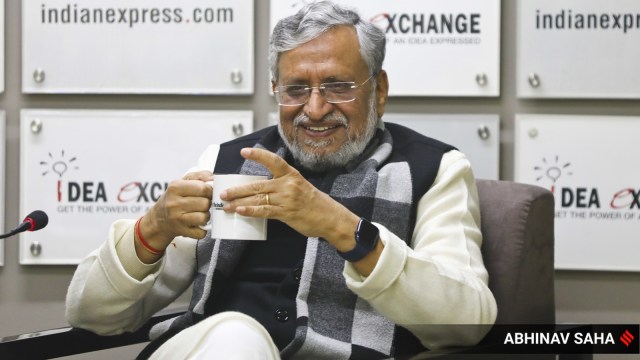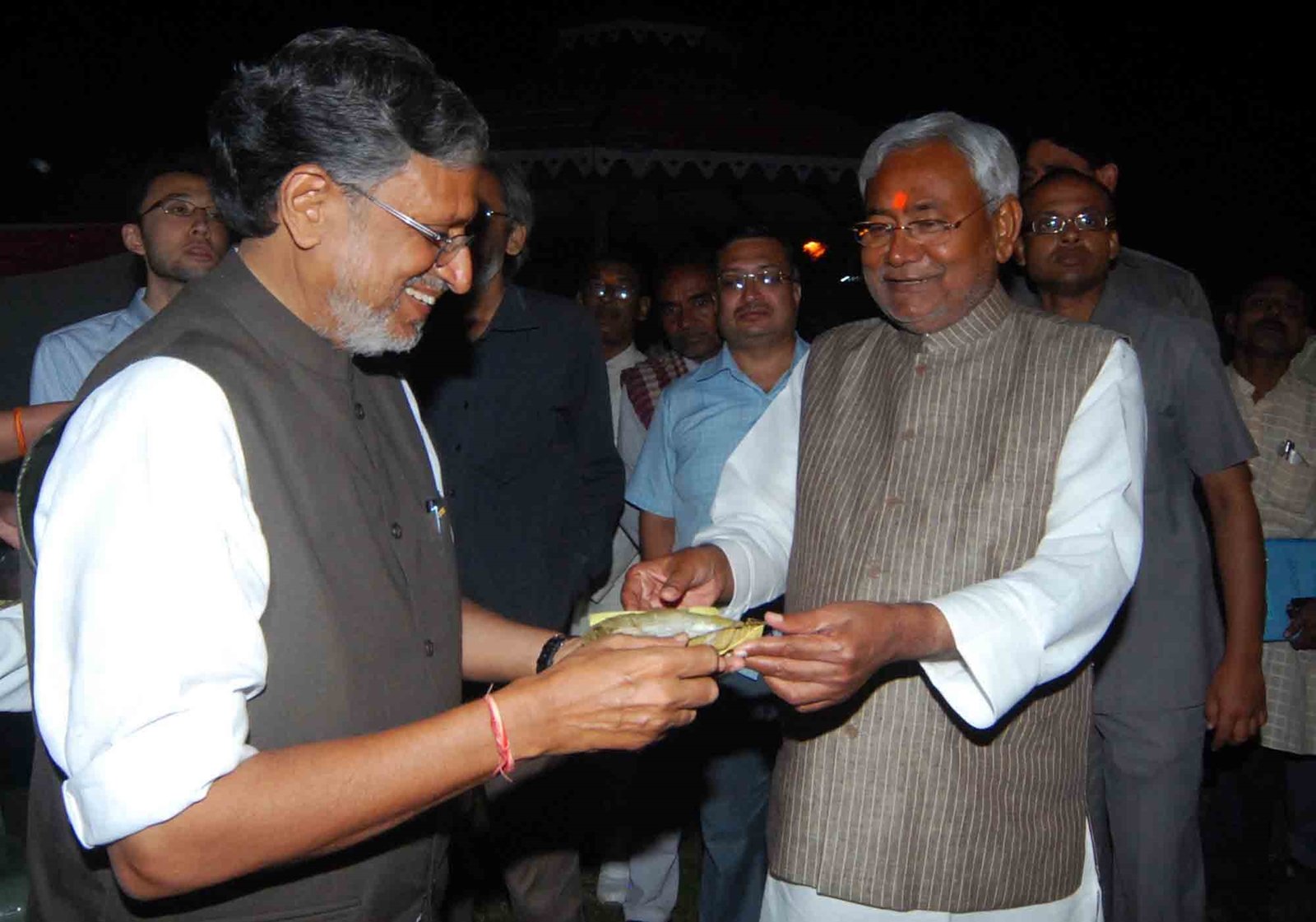
Sometime in the late 1990s, second-term BJP MLA from Kumhar (Patna) and leader of Opposition, Sushil Kumar Modi, approached Kailashpati Mishra, one of the founding fathers of Bihar BJP, with the idea of commemorating the birth anniversary of socialist icon and former CM Karpoori Thakur. Mishra was livid at the idea. “Who is Karpoori Thakur? What is he?”, said Mishra to a young Sushil Modi.
It was a time when the state BJP was trying to overcome the dominance of its upper-caste leadership. Lalmuni Chaubey, the second-most important leader in the state party and a Brahmin leader, had been elected as Lok Sabha MP in 1996, leaving the state’s reins to the younger generation — Sushil Modi and Nand Kishore Yadav, both OBCs. Mishra, who was finance minister in the Karpoori Thakur government (1977-1979), too knew that the BJP needed to move beyond being seen as a “Brahmin-Bania” party. In 1998, when Nand Kishore Yadav became BJP state president and arrived at the party office, Mishra rose from his chair and others also followed. Sushil Modi’s eyes sparkled at Mishra’s gesture. He saw the arrival of OBC politics. Modi and Yadav successfully pushed the idea of commemorating Karpoori Thakur.
Sushil Modi often used to say that Karpoori Thakur, the EBC icon, had been perhaps the most celebrated leader after B R Ambedkar for political parties trying to stitch a rainbow social coalition. Under PM Narendra Modi, the BJP only consolidated OBC and EBC politics and it celebrated Karpoori’s legacy. When the NDA government recently conferred the Bharat Ratna on Karpoori Thakur, the BJP’s politics of OBC mobilisation came full circle.
The Bihar BJP’s politics since the mid-1990s saw the prominence of OBC and EBC leaders. Nand Kishore Yadav is currently the Bihar Assembly Speaker. When Samrat Choudhary was elevated as BJP state president in 2023, Sushil Modi told me: “The BJP has taken a political decision after a long time by looking at consolidating OBC Kushwaha votes.” He wasn’t surprised when Samrat emerged as the leader of the BJP legislature party and became deputy CM after Nitish Kumar returned to the NDA.

Another of Sushil Modi’s contributions was introducing a unique brand of coalition politics with Nitish Kumar. Though he had been a more prominent face of the 1974 JP Movement than Nitish, he conceded leadership position in 2000, when Kumar had become CM for seven days. Sushil Modi recalled: “Kailashpati Mishra had vehemently opposed the idea, believing that the BJP would never develop its leadership if it gave the top spot to Nitish. But the party had to reconcile with the constraints of coalition politics to defeat Lalu Prasad… During the second phase of the 2005 assembly polls, I was the first person to announce Nitish as the CM candidate, with Arun Jaitley supporting the idea”.
Nitish Kumar was not too comfortable with having a deputy CM, saying there could be “two power centres”. Sharad Yadav and Arun Jaitley convinced him of Sushil Modi’s appointment. Often derided for being a “meek and docile number 2”, Sushil Modi used to defend himself by saying that “when we are in government, our people can become ministers and hold other important positions and eventually, the central high command will take a final call of party matters”. He was averse to showing “unnecessary aggression” for media consumption, a la Giriraj Singh.
He earned the position of deputy CM not just because of his seniority but also his attacks on Lalu Prasad over the fodder and land-for-jobs scams, among others. A former RJD minister facing allegations under the coaltar scam once came to Sushil Modi with folded hands and said, “Ab to baksh do (spare me, please).” Yet, neither Lalu Prasad nor any other RJD leader nursed any personal grudge against him. Sushil Modi had become one-man army to dislodge Mahagathbandhan by holding 48 press conferences to expose Lalu Prasad for running sham companies and allegedly being involved in land-for-job scam. Amidst barrage of allegations against Lalu and his family, CBI raided their premises. Embarassed Nitish dumped RJD and came back to NDA. Sushil Modi again became deputy CM. In fact, his position was hard-earned.
The Bihar BJP under Sushil Modi was a different creature until the rise of Narendra Modi in 2014, when most political decisions began to be taken from Delhi. If Nitish Kumar used to take credit for the state not having seen any major communal tension under his regime, a lot of the credit for that goes to Sushil Modi and Nand Kishore Yadav for “nipping any communal tension in the bud”.
“Nitishji would call Nand Kishore Yadav and me asking us to do everything possible to ensure that there is no communal violence during Ramnavami or Durga puja”, Sushil Modi once said. He was also criticised by some of his party leaders for being “too pro-Nitish”. He ended up scoring a self-goal by telling The Indian Express in a 2012 interview that “Nitish is a PM material”. That interview likely hurt his political career. But he remained unapologetic. “I had said it correctly in the context of the time. It was not against Narendra Modi, who had not arrived on the national scene in 2012.”
The third dimension of Sushil Modi’s politics was his deft financial management as finance minister-cum-deputy CM between 2005 and 2013 and 2017 and 2020. While Nitish got all the credit for the economic turnaround between 2005 and 2015, especially with the infrastructure overhaul, Sushil Modi ensured that the state could speed up its revenue from the registration of land plots and flats. Excise tax that barely amounted to Rs 500 crore shot up to about Rs 5,000 crore by 2016 when Nitish decided to enforce prohibition. Sushil Modi also would present the gender budget of which the popular bicycle scheme for girls was the biggest highlight.
Sushil Modi remained an organisation man till his last breath. As PM Modi was conducting his roadshow in Patna, Sushil Modi was nearing the end at AIIMS. When his close aide Shailendra Ojha told him of the roadshow, Sushil Modi gestured that he knew that. Hours later, he slept and passed into eternity the next night in the presence of his family and close aides.
Sushil Modi started his journey with JP’s blessings and now rests in peace under the bridge named after the socialist icon, who changed the social context and contours of Bihar’s politics by creating popular leaders. Sushil Modi was certainly one of the greats among them.
santosh.singh@expressindia.com


